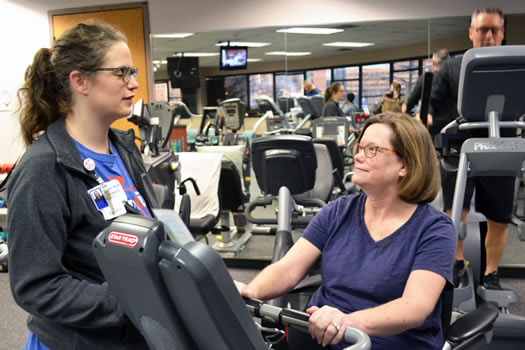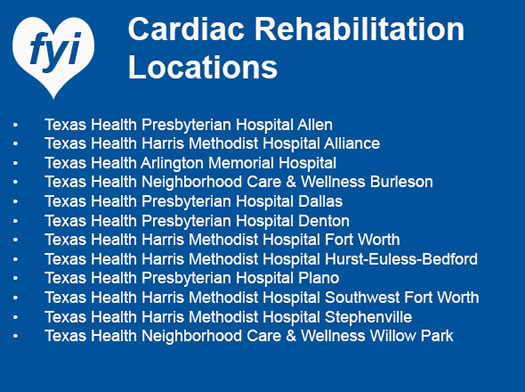When Dee Blakeney pushes herself to get out of bed and drive to her cardiac rehabilitation class at Texas Health Presbyterian Hospital Dallas at 6:45 a.m., she knows why she does it.
"It's not easy to get here so early, but it's working," said Blakeney.
In October, she suffered an attack of cardiomyopathy, or "broken heart syndrome," brought on by stress. After treatment, she sought help with her rehabilitation.

"This is guidance that's getting me to a point where I'm going to be able to say, 'I can go do that. I know what to do now,'" Blakeney said at the half-way point of a 12-week class.
Rehabilitation Services manager Venessa Gonzalez, P.T., FAAOMPT, has seen what Blakeney and the other patients in the classes at the Finley Ewing Cardiovascular and Fitness Center (CVC) can expect when they have completed the class.
"People come in here after an event and they're depressed, they are deconditioned, they are kind of bewildered and angry and at the end of 36 sessions they are, I can honestly say, a different person with a new take on life," said Gonzalez.
Although it's been referred to as physical therapy for the heart, cardiac rehab is much more than exercise.
"While they are here their blood pressure and heart rate are being monitored, they are talking to clinicians like me, their medications are being managed," said Kimbra Gibbs, EP Program Coordinator, "and we send daily reports of their EKG, exercising and resting, to their cardiologist."
The patients meet with members of a Texas Health Dallas multidisciplinary team which may include a registered dietitian, exercise physiologists, physical therapists, occupational therapists and fitness specialists who provide tools to adopt and manage a healthier lifestyle.
"Unlike a few visits to a physician's office, patients see us for 36 visits over three months," Gonzalez said. "It's an investment. And the whole time we are there educating, we are there motivating and we're there giving them support. They also have the camaraderie of a like-minded patient; the person next to them on the treadmill may have had a different event but they went through an event."
Stress-free environment
"There are people around you who are focused on what's right for you, where you are in that moment," said Blakeney. "It's a very comfortable environment. It's not a big space. Physically it just feels comfortable and you literally feel safe. The staff rotate around talking with you so everyone there is getting to know you. And it's clear that they pay very close attention to everything that's happening. You never repeat yourself; when you say something once they remember it."
"It comes down to trust," Gibbs said. "The first couple of sessions they might be super quiet and not want to share much but once you form that trust they start sharing."
Physicians are key to patient participation
Each year roughly 915,000 Americans will have a heart attack and more than 30 percent will have a second and potentially fatal event, according to the American Heart Association (AHA). Despite the documented benefits, cardiac rehabilitation is underutilized, particularly among women and minorities.
The AHA attributes low participation to the lack of a referral or a strong endorsement from the patient's physician, limited or no health insurance coverage, and conflicts with work or responsibilities.
Gonzalez said many local cardiologists support cardiac rehabilitation. To help raise awareness, her team visits appropriate patients before they are discharged from the hospital, sharing information about the program.
"Texas Health is proud to be actively engaged in promoting and growing cardiac rehabilitation to meet the needs of our cardiac patients across the continuum of care," said Sheryl Brown, P.T., MSPT, system program director of cardiac and vascular rehabilitation. "We educate physicians on the benefits of rehab and on our services. We are continuously exploring ways to maximize the use of technology by ensuring that all patients with cardiac rehab diagnoses get an order from their physician."
Brown said Texas Health is also examining innovative treatment models to serve patients such as telehealth technologies to provide a home-based option to those patients who can benefit from this approach.
Growth strategies for cardiac rehabilitation are centered around improving access, ease of use, and coordination of care across the family of Texas Health hospitals. And in 2018, Texas Health launched a system wide vascular rehabilitation program at 12 entities, which provides a specialized exercise program to patients who have symptomatic peripheral arterial disease.
Time well spent
Blakeney was already aware of the CVC's cardiac rehabilitation program because her husband went through it two years ago after a cardiac incident. She asked her cardiologist about it and didn't need any convincing about the benefits. But she understands that the time commitment could be a difficult hurdle for many women.

"Many women are hesitant to take the time to take care of themselves, and it's a disruption in your day," said Blakeney. "But whatever got you here, take a deep breath and recognize that for some reason this has happened to you. You're not going to get out of it completely on your own. You need and you deserve some help. You should just give yourself some grace to take some help for three months."
"It is absolutely worth your time in investing in yourself."
Gonzalez hopes to make the program more convenient for consumers. She is exploring satellite centers to reduce commutes. Meanwhile she wants to get the word out to patients. "It's like there's this stigma once you have a heart attack," Gonzalez said. "They say 'Okay, I'm done for. That's it.' No, no it's not. Not even close."
Related News
About Texas Health Resources
Texas Health Resources is a faith-based, nonprofit health system that cares for more patients in North Texas than any other provider. With a service area that consists of 16 counties and more than 8 million people, the system is committed to providing quality, coordinated care through its Texas Health Physicians Group and 29 hospital locations under the banners of Texas Health Presbyterian, Texas Health Arlington Memorial, Texas Health Harris Methodist and Texas Health Huguley. Texas Health access points and services, ranging from acute-care hospitals and trauma centers to outpatient facilities and home health and preventive services, provide the full continuum of care for all stages of life. The system has more than 4,400 licensed hospital beds, 6,400 physicians with active staff privileges and nearly 29,000 employees. For more information about Texas Health, call 1-877-THR-WELL, or visit www.TexasHealth.org.
